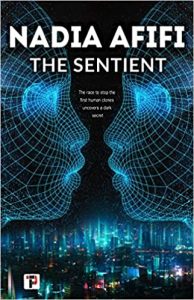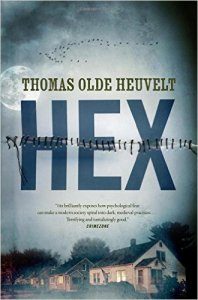Gabino Iglesias Reviews The Sentient by Nadia Afifi
 The Sentient, Nadia Afifi (Flame Tree Press 978-1-787-58432-7, $14.95, 304pp, tp) September 2020.
The Sentient, Nadia Afifi (Flame Tree Press 978-1-787-58432-7, $14.95, 304pp, tp) September 2020.
Nadia Afifi’s debut novel The Sentient is the kind of science fiction narrative that comfortably inhabits the realm of plausibility. There is superb technology on display here, including ways of dealing with trauma that would be very useful today, but human suffering, stress, death, and the dark side of religious fanaticism are at the core of the novel, showing that annoying human trait of moving forward in terms of what we can do while simultaneously staying behind on the things that matters most.
Amira Valdez is a young neuroscientist with dreams of bringing her talents to outer space. She is an outstanding student with a promising future, but she still struggles dealing with her past. Amira grew up in strange religious compound known as Children of the New Covenant where physical and emotional abuse was normalized, and the life she has built after escaping isn’t completely free of the trauma and bad memories of her years spent at the compound. When, instead of getting the assignment she wanted, Amira gets an assignment working at a controversial cloning project on Earth, she enters a new era of turmoil that threatens to destroy everything she has worked so hard to achieve. The project already has two dead pregnant women on their record, and a third one isn’t doing so well, so Amira must help reveal the psychological causes behind the patient’s struggles. She starts digging in the patient’s memories, but soon finds herself wrapped up in a conspiracy to stop the creation of the first human clone and involved with a plethora of people who have secret agendas on both sides of the cloning battle.
The best thing about The Sentient is that it brings a timely topic – cloning – to center stage and imagines the implications of it above and beyond the technology, which we already have. Also, it shows a world in which technology allows people like Amira to look into the dreams and memories of others, but looking isn’t enough, and human memories, and the way our brains process, change, and block traumatic events, is still an issue because things get caught, or lost, in “the shapeless fog of memory.”
In a way, The Sentient is a classic science fiction narrative, but the religious elements and the secretive groups that are trying to make the cloning happen or fighting against it, make this novel feel like a psychological thriller. Amira has to keep secrets from both sides, steal things, and watch her back, all while also trying to help Rozene, her pregnant patient, and dealing with the fact that Rozene’s darkest, scariest, most important memories are, much like Amira’s, tied to her own time at a religious compound that was a bit worse than the one Amira spent her childhood in.
The technology in this novel never takes center stage, except when it deals with dreams and memories, when Amira is performing her holomentic readings. The rest of the time, transportation, robots, biomechanical alterations, and the presence of something like our internet that can stay in front of someone (literally in front of one eye) are elements that enrich the story and give it a sense of being futuristic, but a future that is almost here. Also, there is a sense of history here, a memory of how far the study of the human mind has come that also recognizes there are plenty of mysteries left. For example, Amira and her friend D’Arcy discuss the “nocebo” effect, which shows the unlimited power of the mind:
Back in eighteenth century Vienna, these medical students decided to play this prank on a teacher’s assistant they hated. They ambushed him after class, held him down and told him he was going to be decapitated. They pushed his head on a block and blindfolded him. One of them wrung a wet cloth so that a drop of water fell on his neck. He felt it, thinking it was the cold of a blade, and died. Right there, on the spot.
Amira is a strong, likeable character. Her years spent in the religious compound, which left her with physical as well as psychological scars, make her feel vulnerable but also strong, a survivor. The way Afifi deals with religious fanaticism feels incredibly timely, as if she’s showing us that, in the future, zealotry will be still be a problem not only because people will still love the power religious control gives them, but also because humans will always learn to use whatever technological or chemical advances are made to generate profit, retain power, control others, and support the status quo of whatever benefits their agendas.
The Sentient takes place in 2227, which isn’t too far into the future. The presence of problematic elements from our society in this advanced version of it works in two ways. First, they serve to frame a tense, thrilling narrative about the fight to bring the first human clone into the world. Second, they work as a warning to make sure we advance in all ways as we build the future.
Gabino Iglesias is a writer, journalist, professor, and book reviewer living in Austin TX. He is the author of Zero Saints and Coyote Songs and the editor of Both Sides. His work has been nominated to the Bram Stoker and Locus Awards and won the Wonderland Book Award for Best Novel in 2019. His short stories have appeared in a plethora of anthologies and his non-fiction has appeared in the New York Times, the Los Angeles Times, and CrimeReads. His work has been published in five languages, optioned for film, and praised by authors as diverse as Roxane Gay, David Joy, Jerry Stahl, and Meg Gardiner. His reviews appear regularly in places like NPR, Publishers Weekly, the San Francisco Chronicle, Criminal Element, Mystery Tribune, Vol. 1 Brooklyn, the Los Angeles Review of Books, and other print and online venues. He’s been a juror for the Shirley Jackson Awards twice and has judged the PANK Big Book Contest, the Splatterpunk Awards, and the Newfound Prose Prize. He teaches creative writing at Southern New Hampshire University’s online MFA program. You can find him on Twitter at @Gabino_Iglesias.
This review and more like it in the May 2021 issue of Locus.
 While you are here, please take a moment to support Locus with a one-time or recurring donation. We rely on reader donations to keep the magazine and site going, and would like to keep the site paywall free, but WE NEED YOUR FINANCIAL SUPPORT to continue quality coverage of the science fiction and fantasy field.
While you are here, please take a moment to support Locus with a one-time or recurring donation. We rely on reader donations to keep the magazine and site going, and would like to keep the site paywall free, but WE NEED YOUR FINANCIAL SUPPORT to continue quality coverage of the science fiction and fantasy field.
©Locus Magazine. Copyrighted material may not be republished without permission of LSFF.






